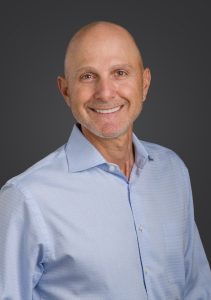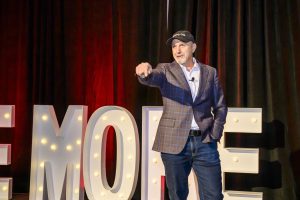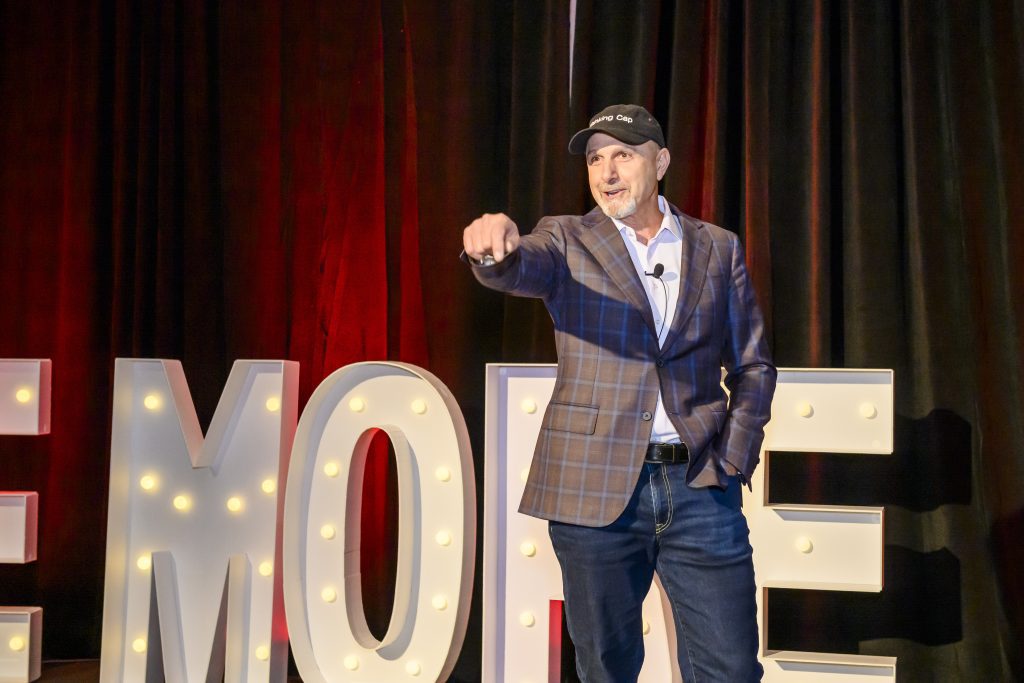In an interview with Chad Silverstein published in Authority Magazine, CEO and President of Rosica Communications, Chris Rosica, shares valuable insights and business wisdom often overlooked in academic settings. From his experience heading a national PR agency, and having started a digital firm in 2008, Rosica discusses the importance of persistence, overcoming fear, attention to detail, goal–setting, and effective communication. Read the full interview below.
Chris Rosica of Rosica Communications On 5 Things They Forgot to Mention In College – An Interview with Chad Silverstein

Always work to help those around you streamline communications for the betterment of everyone.
We are starting a new interview series about the world of entrepreneurship beyond the classroom — a realm where theory meets grit, and education meets real-world challenges. We want to hear about critical business wisdom that often goes unspoken in academic settings. I had the honor of interviewing Chris Rosica.
Chris Rosica is a seasoned, award-winning PR strategist and president and CEO of Rosica Communications (www.rosica.com). He is author of The Authentic Brand, The Power of B2B Social Media, and The Business of Cause Marketing (Noble Press) and has contributed on behalf of the firm’s clients to such national business publications as Forbes, Fortune, U.S. News & World Report, Inc. Magazine, Crain’s, and The Washington Post. He also contributes articles regularly to animal health, education, and healthcare trade publications. Rosica co-founded Interact Marketing in 2008, a digital agency specializing in SEO, content marketing, online reputation management, SEM, and website development. He is a graduate of the Entrepreneurial Master’s Program at MIT.
Thanks for being part of this series. Let’s jump in and focus on your early years. Can you share who was your biggest influence when you were young and provide specific examples of what you learned from them that helped shape who you’ve become and how you live your life today?
When I was 14, I took a job at a restaurant in a neighboring town called The Brookside. The owner, Don Whitaker, was a mentor and someone who taught me the importance of paying close attention to the details, possessing a strong work ethic, and doing my very best at all times (i.e., never slacking and doing things right the first time). He also instilled in me a sense of customer service and care that’s stayed with me to this day.
Staying on the topic of influence, who has been your biggest catalyst more recently and what can you share that you’ve learned from them that led you to making changes in your life?
Over the past two decades, my greatest influences have come from peer-to-peer entrepreneur groups and the principals of other PR firms. For more than a decade, I was a member of The Young Entrepreneurs’ Organization (now EO), a sister organization of YPO. My EO Forum Group was a peer advisory group that was a clear catalyst for growth and change. They shared their experience and best practices that enabled me to adopt/implement systems that typically only large companies possess. The group also stresses personal development and success, which helped me grow as a person — not just professionally. For decades, I have also been a member of the Croft Society, a national network of privately held PR agencies from around the country. Members meet twice annually to share genuine success (and failure) stories and ideas for growth, evolution, and fulfillment. I am very grateful for this group and trust these agency owners — and their teams — for their candor, confidentiality, and experience. There is tremendous wisdom you receive when you’re transparent, demonstrate humility, and share openly.
Mistakes are invaluable. Can you name one specific mistake that you made early on, and learned the most from, but wish you’d been forewarned about?
One mistake I made as a young PR manager was expecting too much of others. Sometimes I expected junior colleagues to be mind-readers and in other instances to be infallible — with completely well-rounded skillsets in all aspects of the business including client relations, media relations, writing, organization, attention to detail, project management, proactive communications, etc. My expectations were not aligned with reality.
What I’ve learned is that it’s the job of leadership to play to people’s strengths while offering training opportunities for all team members along the way. Some people may never be great at client relations (or may not feel comfortable in that position), for instance, but they may be great at media relations. This is a critical skill in PR and illustrates the importance of recognizing an individual’s unique talents and enabling them to shine.
Is there a leadership myth you believed early on that you’ve since debunked through your real-world experience?
In 2004, Michael Gerber, whom I’ve known for many years, wrote a best-selling book called The E-Myth Revisited: Why Most Small Businesses Don’t Work and What to Do About It. In this book he talks about the importance of an entrepreneur or business owner taking the time to work “on” their businesses, not just “in” them. I took his message to heart and focused on delegation and having others perform most, if not all, client-related tasks. Over the years, however, I lost touch with what I love about the PR industry, especially writing and strategy. Today, I am on nearly every client call, I regularly write for national publications on their behalf, and I’m constantly plugged into their industries, goals, objectives, and challenges. Nothing brings more satisfaction than providing this service. While Michael’s thesis is (still) highly relevant and applicable in most industries and cases, I’ve learned that I’m happiest when doing the work, and completely in tune with our clients and their people.
What’s the key operational insight you’ve gained since running your business that was never mentioned in any classroom?
One topic that’s rarely, if ever, talked about in traditional higher ed settings is the 3 Cs and how they’re inter-related: Courage, Candor, and Communications.
It’s my responsibility to encourage members of the team to improve and streamline communications and acknowledge them for the courage it takes to speak up. This may entail asking for help on a particular project, requesting support, or providing candid feedback on ways to improve operations or client service. It’s critical that the senior leadership team remind people they should not be afraid to ask for clarification or support from management or their colleagues.
Candor is critical. Proactive, straightforward communications can help balance workloads, save people time (e.g., not wasting team members’ time at meetings where they don’t have an active role or simply don’t need to attend), and ensure action steps from all calls, virtual or in-person meetings, and internal conversations are documented and followed through on.
Did college prepare you for scaling a business? What specifically was missing?
Johnson & Wales, FIU, and MIT taught me critical aspects of business, but it takes mentorship, peer to peer support, and work experience to grow into a leadership role and effectively scale a business. While my higher ed experience did not prepare me for growing the businesses I’ve run and started, it helped me become more resourceful, taught me how to employ critical thinking, and showed me how much there is to learn — and that learning should be a lifelong endeavor.
One key principle that’s missing in many institutions of higher learning (except for schools like Johnson & Wales, which emphasizes it — particularly in its Culinary Arts program) is attention to detail. It’s critical in everything we do at our agencies and with the organizations we partner with. It’s just as important at our PR agency as it is among the industries we work in, like education, nonprofit, healthcare, food, and animal health. A focus on the detail, systems, and organization enables you to successfully scale up.
One soft skill young adults entering the workforce must learn, which demonstrates attention to detail, is managing up. For example, it’s critical team members (always) ask for deadlines, take great notes, and constantly clarify priorities and action steps.
Any unexpected challenges in team dynamics that your academic experience didn’t prepare you for? How did you handle it?
The universities I attended did not emphasize building students’ soft skills and did not teach how to build corporate cultures. Maybe they do today, but it wasn’t part of the curriculum back then.
In Jean Eddy’s new book, Crisis-Proofing Today’s Learners: Reimagining Career Education to Prepare Kids for Tomorrow’s World (Rowman & Littlefield, 2023), the author talks about the [soft] skills needed for youth to succeed in today’s world — skills that foster strong team dynamics. She says soft or “durable” skills must be taught starting young (and throughout college). These are a set of professional capabilities like teamwork, problem solving, critical thinking and flexibility — that are essential in almost every job. They include communications, problem-solving, self-management, digital fluency, data analysis, digital content creation, and digital safety. Eddy says we owe it to younger generations to teach them soft skills because employers require them today.
Have you had to unlearn any widely-accepted business “wisdom” in your journey? What was it and how did it affect your strategy?
So much has changed today — and I’m grateful to have embraced this. When I was a young adult and working in restaurants starting in high school, I was told that I didn’t have to like the boss — and that it didn’t matter what I thought of him/her.
Today’s young people have agency and stand up for what they believe is right. It’s my responsibility to understand their perspective and support them in the ways they need it most — not based on pre-conceived notions and what I required (or didn’t) when I was coming up. I also heard “you can’t teach an old dog new tricks.” In my career and life, it’s been the complete opposite. I’m more teachable today than ever before. Gratefully, wisdom has come with years, and I’m fortunate that it’s been an educational, rewarding, and meaningful journey.

Photo Credit: National Society of High School Honors (NSHSS)
What’s your advice for new entrepreneurs? What are your “5 Things You Won’t Learn in College But Must Know to Succeed in Business”?
- Persistence, persistence, persistence — the primary ingredient of the successful businessperson or entrepreneur.
- Don’t let fear run the show.
- Hone your attention to detail.
- Set goals and share them with your boss, business partner, mentors, or advisors.
- Always work to help those around you streamline communications for the betterment of everyone.
How do you ensure your team not just understands but embodies your business principles? Any techniques you wish you’d known earlier?
We communicate often but avoid “death by meeting.” We recently had an agency-wide retreat in Burlington, VT, where we have a satellite office. It wasn’t all business; it was a time to connect personally and get to know one another better. The best part is that we genuinely like, accept, and respect one another.
One thing I wish I’d known years ago was the power of effective daily huddles. Not hours but minutes spent daily gauging where people are at, if they’re overwhelmed or stuck, want to step up and own a project, or have a win to report so we can celebrate.
If we were sitting together two years from now, looking back at the past 24 months, what specifically has to happen for you personally and professionally, for you to be happy with your results?
I’d be reporting back about my fourth book, The Top Three Mindset, and how it’s helping people better manage their time and affording them the opportunity to be more effective in their (personal and business) lives. I’d also share the success of the first thought leadership measurement tool of its kind and caliber, the Thought Leadership IndexTM. This tool will help countless organizations, particularly in the education, nonprofit, animal health, food, and healthcare sectors, gauge the effectiveness of their thought leadership activities and communicate how they can outpace the competition.
Looking back over the last two years, what key accomplishments make you satisfied with your progress?
Rosica Communications was named by Forbes as one of “America’s Best PR Agencies,” a list reserved to only 300 PR agencies in the U.S. (out of more than 13,000 firms!). What meant so much to our team was the fact that Forbes interviewed our clients — not us — for this ranking. It came as a complete surprise, and demonstrated our clients’ appreciation, which made this recognition so special.
We’ve built and maintained a very strong team with an average employee tenure of more than 13 years. What’s more, our younger team members are amazing, and our culture is more fulfilling and positive than it’s ever been (in more than 40 years in business).
With the support of our team, who capably managed client relations and deliverables, I was able to complete my third book, The Power of B2B Social Media.
Within the past 48 months, Rosica also won multiple PR industry awards for its work with nonprofits and education companies, including a First Place Mercury Award, NJ Ad Club Award (First Place), top honors in PRSA’s Big Apple Awards, and a First Place PRSA Pyramid Award.
As someone with significant influence, what’s the one change you’d like to inspire that would benefit the most people?
If collectively we can lessen our fears and anxieties, through whatever healthy means possible (including the support of our families, counselors, colleagues, and friends), we can boldly focus on other peoples’ well-being — and not shrink by thinking only of what we want, need, or don’t yet have.
How can our readers keep up with your work?
Follow my LinkedIn: https://www.linkedin.com/in/chrisrosica and www.rosica.com.
Thank you so much for joining us! We wish you only success.
About the Interviewer: Chad Silverstein is an accomplished entrepreneur and visionary leader. He started his first company, Choice Recovery, Inc., while attending Ohio State University and grew it to become an industry outlier before selling the business after 25 successful years. With the launch of his second venture, [re]start, a career development platform, Chad aimed to help people find meaningful career opportunities. Under his leadership, his team was recognized as a “Top Workplace” award winner for over a decade, twice being ranked the #1 small and medium-sized business to work for in Central Ohio. Chad sold [re]start in 2023, enabling him to focus on building an online community of high-performing leaders and continuing to make a positive impact in people’s lives.

